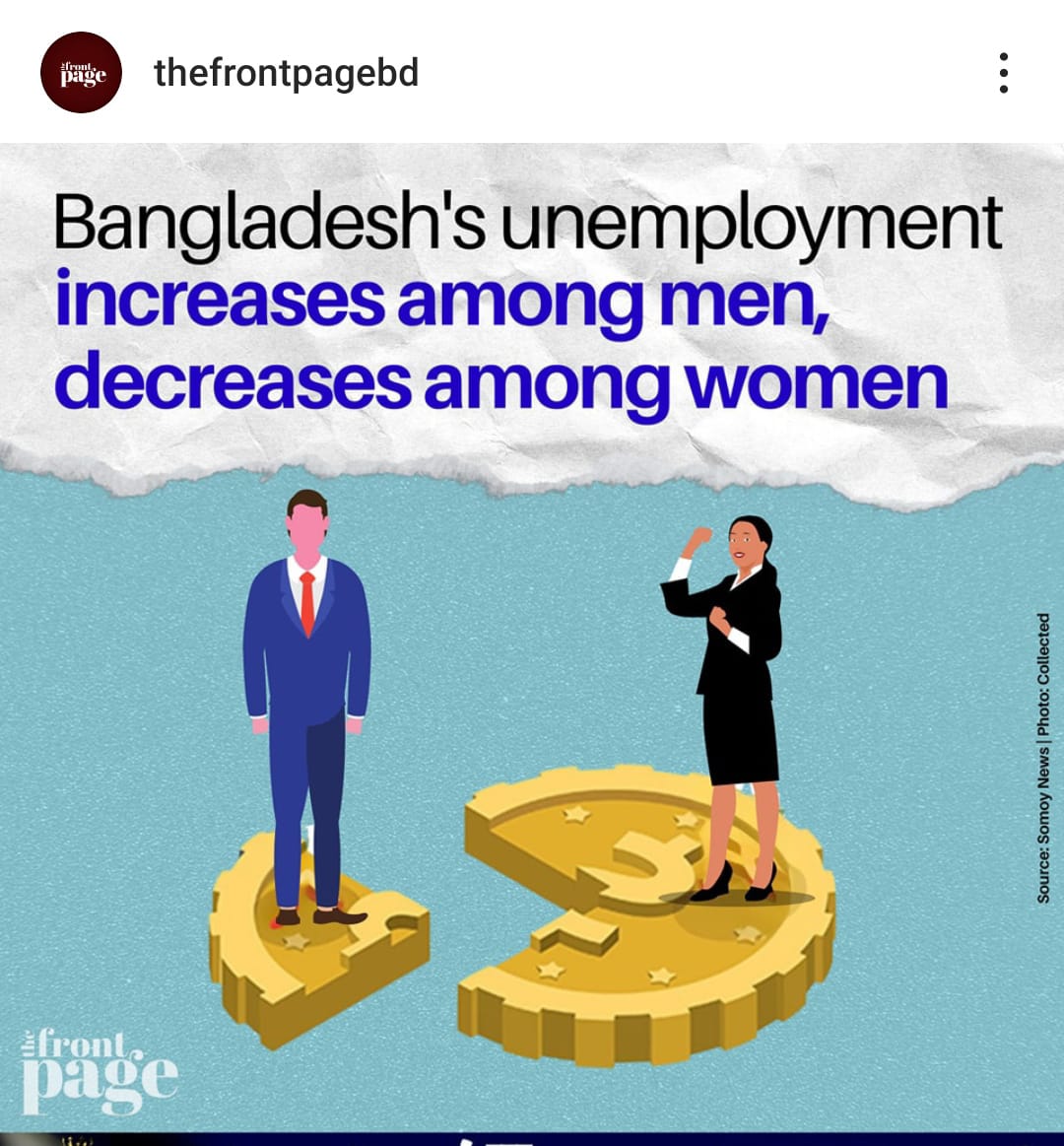I was scrolling through Instagram when I noticed a news article on -The Front Page which stated that the number of unemployed men has increased, while the number of unemployed women has decreased.
For fact-checking, I went through the Daily Star online newspaper. I found this very interesting in light of the growing number of women in the workforce. Therefore, I scrolled down to read the comments to see others’ opinions on this matter, I was surprised to see that most of the men think women got jobs by satisfying their bosses’ sexual desires or by taking advantage of quotas in the job sector. Some of them are also claiming that corporate companies use women’s faces to attract clients, and that is how women are getting jobs without having any professional skills. It’s disheartening to see that whatever women do in their job sector, it is always portrayed as being without any skillful contribution and instead only as having sexual appeal. The idea that one can achieve a promotion at work by satisfying their boss in bed is an archaic concept that has been prevalent in the world for a long time.
Two distinct patterns of argument emerge from these comments. The first claims that women use their appearance or gender to secure jobs or promotions, as exemplified by statements like-রূপ দেখে জব দিলে তো এমন ই হবে (If jobs are given based on looks, then this is bound to happen), “women now trade in leather due to this their unemployment decreased” means that women’s bodies are being utilized in the job sector, leading to decreased unemployment. The second pattern of argument posits that women are obtaining jobs due to quota systems.
These arguments collectively undermine the notion that women can secure jobs based on their intellectual skills and professional qualifications. Analyzing the contexts in which these arguments arise, it becomes evident that such claims are often made by men in patriarchal societies who feel entitled to promotions they believe they deserve. They view job sectors as predominantly male domains, where women are expected to work under their supervision. These men fear that the rise of women in the workforce threatens their own power and job security. This fear is rooted in the belief that women are encroaching on jobs meant for men, resulting in a sense of dispossession and insecurity. Consequently, they attribute their lack of promotion or hiring to women benefiting from quotas or using their sexual appeal to advance.
During my first undergraduate year, male peers frequently dismissed my academic concerns, asserting that my gender would secure a comfortable future without the need for competition. This attitude is contradictory: while they suggest women are fortunate for not needing to toil, they resent it when women challenge traditional gender roles. Michael Kimmel’s insights elucidate this phenomenon of male dispossession in a changing society. Some men perceive their traditional privileges slipping away, directing their anger toward women’s success and scapegoating them (Kimmel, 2013). This reflects the struggles faced by women globally, including in Bangladesh, where societal shifts threaten established power dynamics.
Men who perceive women’s professional success as a threat often compare themselves unfavorably to women. Historically, men have been considered more intelligent and have occupied leadership roles, making it difficult for them to accept women excelling. They justify women’s success by attributing it to external influences or seduction, it also reflects a belief that women’s achievements are a result of male approval in exchange for pleasure.
So, we can say that this feeling of dispossession fuels their rage against women, creating a belief that women are limiting their job opportunities. This rage might manifest as a form of superiority, where men believe they still hold the power to approve women’s employment.
The irony is that in a patriarchal society, women are expected to provide emotional labor and display caring and prosocial behavior at work as a job requirement, as this aligns with societal expectations of softness and femininity. Women who do not conform to the expectation of constantly smiling and being cheerful in the workplace are often labeled as rude and oversensitive, not professional in the work environment.
This characteristic observation regarding women’s employment creates a concept that job-holder women are unethical and disrespectful towards social values. This may create further barriers for women from conservative religious families who want to pursue a career.
